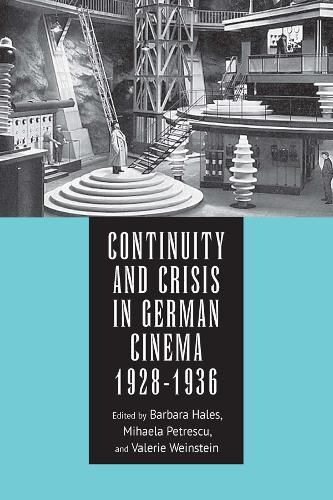Readings Newsletter
Become a Readings Member to make your shopping experience even easier.
Sign in or sign up for free!
You’re not far away from qualifying for FREE standard shipping within Australia
You’ve qualified for FREE standard shipping within Australia
The cart is loading…






Hitler’s Machtergreifung, or seizure of power, on January 30, 1933, marked the end of the Weimar Republic and the beginning of the Third Reich, and German film scholarship has generally accepted this date as the break between Weimar and Nazi-era film as well. This collection of essays interrogates the continuities and discontinuities in German cinema before and after January 1933 and their relationship to the various crises of the years 1928 to 1936in seven areas: politics, the economy, concepts of race and ethnicity, the making of cinema stars, genre cinema, film technologies and aesthetics, and German-international film relations. Focusing both on canonical and lesser-known works, the essays analyze a representative sample of films and genres from the period. This book will be of interest to scholars and students of Weimar and Third Reich cinema and of the sociopolitical, economic, racial, artistic, and technological spheres in both late Weimar and the early Third Reich, as well as to film scholars in general.
Contributors: Paul Flaig, Margrit Froelich, Barbara Hales, Anjeana Hans, Bastian Heinsohn, Brook Henkel,Kevin B. Johnson, Owen Lyons, Richard W. McCormick, Kalani Michell, Mihaela Petrescu, Christian Rogowski, Valerie Weinstein, Wilfried Wilms.
Barbara Hales is Associate Professor of History at the University of Houston-Clear Lake. Mihaela Petrescu is Visiting Lecturer at the University of Pittsburgh. Valerie Weinstein is Assistant Professor of Women’s, Gender, and Sexuality Studies and German Studies at the University of Cincinnati.
$9.00 standard shipping within Australia
FREE standard shipping within Australia for orders over $100.00
Express & International shipping calculated at checkout
Hitler’s Machtergreifung, or seizure of power, on January 30, 1933, marked the end of the Weimar Republic and the beginning of the Third Reich, and German film scholarship has generally accepted this date as the break between Weimar and Nazi-era film as well. This collection of essays interrogates the continuities and discontinuities in German cinema before and after January 1933 and their relationship to the various crises of the years 1928 to 1936in seven areas: politics, the economy, concepts of race and ethnicity, the making of cinema stars, genre cinema, film technologies and aesthetics, and German-international film relations. Focusing both on canonical and lesser-known works, the essays analyze a representative sample of films and genres from the period. This book will be of interest to scholars and students of Weimar and Third Reich cinema and of the sociopolitical, economic, racial, artistic, and technological spheres in both late Weimar and the early Third Reich, as well as to film scholars in general.
Contributors: Paul Flaig, Margrit Froelich, Barbara Hales, Anjeana Hans, Bastian Heinsohn, Brook Henkel,Kevin B. Johnson, Owen Lyons, Richard W. McCormick, Kalani Michell, Mihaela Petrescu, Christian Rogowski, Valerie Weinstein, Wilfried Wilms.
Barbara Hales is Associate Professor of History at the University of Houston-Clear Lake. Mihaela Petrescu is Visiting Lecturer at the University of Pittsburgh. Valerie Weinstein is Assistant Professor of Women’s, Gender, and Sexuality Studies and German Studies at the University of Cincinnati.